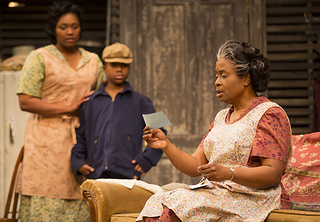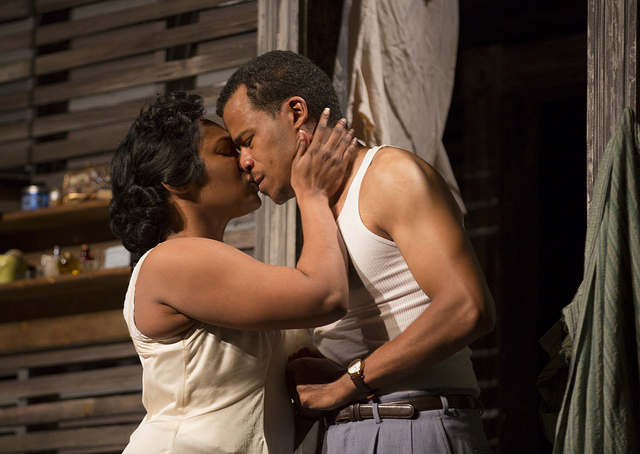Theater Review: A Searing “Raisin in the Sun”
Director Liesl Tommy’s unflinching approach gives Lorraine Hansberry’s classic a surprising urgency more than half a century after the drama first played on Broadway.
A Raisin in the Sun by Lorraine Hansberry. Directed by Liesl Tommy. Staged by the Huntington Theatre Company at the Boston University Theatre, Boston, MA, through April 7.
By Terry Byrne

Ashley Everage (“Ruth Younger”), Cory Janvier (“Travis), and Kimberly Scott (“Lena Younger”) in the Huntington Theatre Company’s production of A RAISIN IN THE SUN. Photo: T. Charles Erickson
The gaping slats of the Younger family’s cockroach-infested apartment walls leave no room for privacy. In the Huntington Theatre Company’s searing new production of A Raisin in the Sun, everything is laid bare. Characters may step away for a moment alone for a quiet smoke, but Clint Ramos’ revolving set allows them no peace. Even their dead father, whose life insurance policy sparks the action of the play, is visible to the audience, watching his family’s turmoil in silent agony.
Director Liesl Tommy’s unflinching approach gives Lorraine Hansberry’s classic a surprising urgency more than half a century after the drama first played on Broadway. It’s not that little has changed in our country’s racial politics—although it hasn’t—it’s more that this family’s pride and hope, in the face of nearly insurmountable obstacles, feels utterly familiar. Even better, like those see-through walls in the Younger’s home, Tommy has forged an ensemble of players who have shed every artifice, let go of everything that smacks of performance, offering a window into these characters’ lives that makes us forget we’re in the theater.
So rich and layered are these performances, it’s difficult to single out one actor. When the play inhales, it focuses on Walter Lee Younger (LeRoy McClain), the scion of the family whose job as a chauffeur has worn him down and made him resentful of his wife and his mother’s demands. When it exhales, it focuses on the Younger women: matriarch Lena (Kimberly Scott), who saw her husband’s dreams for his family send him to his grave; Ruth (Ashley Everage), Walter Lee’s wife, who is suffering in a lonely marriage and suffocating under the oppressive expectations of her husband’s family; and Beneatha (Keona Welch), the idealistic college student determined to achieve the American Dream by becoming a doctor.
The arrival of the life insurance check awakens different deferred dreams for each member of this family, but the impact on Walter Lee is the most profound. He sees the cash as a business investment opportunity, but it’s obvious to everyone but him that his fantasies about running a business have little connection to the reality of the work involved. McClain allows us to see Walter Lee’s evolution from a narcissistic, childish man to a proud and determined one, with every flicker of triumph, defeat, swagger, and fear on display. We know what’s coming, but McClain draws us in so completely we are as crushed as he is by the outcome of his investment. Watching Walter Lee grow up during the course of the play is a revelatory experience, made compelling by McClain’s forceful embodiment of Hansberry’s character.

Ashley Everage (“Ruth Younger”) and LeRoy McClain (“Walter Lee Younger”) in the Huntington Theatre Company’s production of A RAISIN IN THE SUN. Photo: T. Charles Erickson
While Walter Lee’s dream revolves around wealth, the Younger women’s dreams focus on a securing a better future for themselves and their children through homeownership and education. Lena unilaterally decides to spend a portion of the money on a down payment on a house, a decision that encourages Ruth to lift her head and express hope and joy for her 10-year-old son Travis’s future. Beneatha is counting on Lena’s investment of some of the money in her education, since a position as a doctor will help her help others. Beneatha shares her dreams with two beaus: the successful George Murchison (Corey Allen), who wants her to be more pliant, and Joseph Asagai (the wonderful Jason Bowen), a Nigerian who encourages her efforts at self-reliance.
The arrival of Karl Lindner (Will McGarrahan), a representative from the white neighborhood of Clybourne Park, where Lena has purchased a home, becomes a test for the Younger’s diverging desires. The moment when Walter Lee turns to Karl and tells him the Youngers come from proud people, we see him swell with pride and embrace his responsibilities. The beauty of Tommy’s direction is that this acceptance comes as the culmination of all of his emotional trials we’ve witnessed throughout the play.
Hansberry doesn’t offer a neatly packaged ending, and we’re left with some concern for the Youngers ability to assimilate into their new, all-white neighborhood and wonder which path Beneatha will choose. But like the drooping house plant Lena keeps encouraging, the staging suggests that with a little more sunlight and tenacity the Youngers will weather the challenges to come.
Arts Fuse interview on comparing Raisin-inspired play Clybourne Park (now at SpeakEasy Stage Company) with A Raisin in the Sun.
Terry Byrne’s Arts Fuse review of Clybourne Park at SpeakEasy Stage Company.
